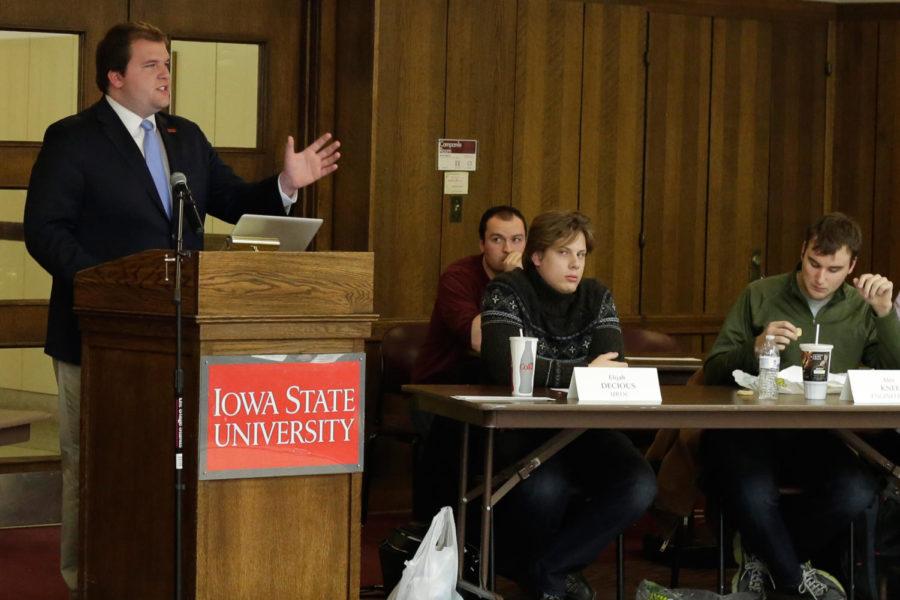Editorial: GSB’s fall decisions provide great momentum for future accomplishments
Spencer Hughes, president of the Government of the Student Body, addresses GSB before the open forum during their meeting on Dec. 4 in the Campanile Room of the Memorial Union.
December 16, 2013
The Government of the Student Body has a tough job. They need to take into account all of student wants, desires and needs, and balance them with what they can afford on their budget. They need to please students, faculty and the university. They need to provide equal representation and find innovative ways to improve campus life.
It isn’t always easy, and in all past years the struggle has been evident. Each group of representatives has worked for the good of the student body, but some semesters have just been more fruitful than others.
Fall of 2013 was one of those semesters. Even to those who do not usually follow the actions and decisions of our GSB, it became obvious that this is a collection of representatives that knows how to get things done.
As in any governmental body, GSB has suffered from opposing opinions on what is best for ISU students. Even if all people elected have the best intentions, they are not necessarily going to accomplish much. This semester’s GSB was able to accomplish many things despite divergence in opinions.
Earlier this month, GSB eliminated the requirement for signatures that was previously maintained for senate candidates. Before this, people who wanted to run for GSB had to collect enough signatures to even be considered. By getting rid of the signature requirement, GSB is eliminating a somewhat pointless part of the election process, and also making it a tiny bit easier for a more diverse group of people to run for GSB Senate — and the more who are willing to run, the better, as competition can produce great results.
Earlier in the year, GSB made a huge decision to get rid of compensation for executive members. Though these members still enjoy tuition compensation for their time spent in GSB, they are no longer supported in room and board expenses. Though this seems like a small step, it allows over $30,000 to be reallocated to other expenditures — say, student organizations or causes. Though some senators argued that this decision takes away some students’ ability to run for executive positions, overall it seems to be a change that benefits the student population, and thus shows GSB’s commitment to the school.
Just a few days ago, another development occurred that speaks to the efficiency of GSB. The long-awaited bike share program, a pet project of GSB Vice President Hillary KletscherCQ, seems to be making steps forward. Not only have plans started to become finalized, GSB is teaming up with the industrial design department to create and implement the system.
In the relatively near future, students will be able to borrow bikes and ride them to campus destinations, after which they will return them to the bike-share racks. Additionally, the project will be enacted by an ISU department, keeping costs internal and potentially providing excellent experience to whichever students are involved in the process.
With the expansion of the student body has come a projected expansion for CyRide transportation. As students already fund a large portion of CyRide costs, GSB is doing what they can to stop unnecessary extra costs being lumped onto student fees. GSB President Spencer HughesCQ has acknowledged that student fees may rise but does not wish for all additional costs to fall on students, and hopefully GSB members and the GSB representatives on the CyRide Board of Trustees will continue to do what they can to keep student fee raises down.
In addition to larger projects and decisions, GSB has been present every step of the way during city decisions. With regular participation in discussions such as the one about Kingland Systems Campustown developments, our GSB senate and executives have shown that they care that students’ voices are heard.
Though no governmental organization is without flaws, the Fall 2013 Government of the Student Body has shown a commendable tendency toward transparency and dedication to students. If this continues into the spring semester and even future years, students and GSB will accomplish greater things than ever before.







